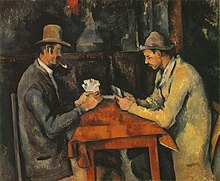For other uses, see Game (disambiguation).

Tug of war is an easily organized, impromptu game that requires little equipment.

The Card Players, a 1895 painting by Paul Cézanne depicting a game of cards.
Key components of games are goals, rules, challenge, and interaction. Games generally involve mental or physical stimulation, and often both. Many games help develop practical skills, serve as a form of exercise, or otherwise perform an educational, simulational, or psychological role. According to Chris Crawford, the requirement for player interaction puts activities such as jigsaw puzzles and solitaire "games" into the category of puzzles rather than games.[1]
Attested as early as 2600 BC,[2][3] games are a universal part of human experience and present in all cultures. The Royal Game of Ur, Senet, and Mancala are some of the oldest known games.[4]

0 comments:
Post a Comment